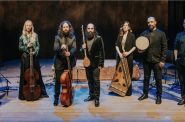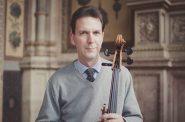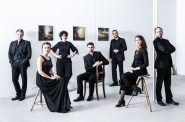Greatest Chamber Music Work Ever Written?
Fine Arts Quartet and guest cellist Dominique de Williencourt, who likes to perform in deserts, take on Schubert's famed cello quintet.
There appears to be no challenge to the claim that Franz Schubert’s Cello String Quintet in C major, D956, is the greatest of all classical chamber works. Wikipedia cites four different sources that make that point. Critic Melvin Berger sums it up. “Through the loftiness of its conception, the spiritual quality of its melodies, and the masterfulness of its technique, the quintet touches listeners in a very special and personal way.” Works of this magnitude call for world class players, like the Fine Arts Quartet. Expect its performance of this work to be the highlight of the FAQ’s concert this Sunday evening, June 14.
French cellist Dominique de Williencourt will join the Fine Arts Quartet (violinists Ralph Evans and Efim Boico, cellist Robert Cohen and violist Juan-Miguel Hernandez) for the Schubert. Few string quintets call for two cellos rather than two violas. Cohen says Schubert’s incorporation of two cellos offers the opportunity to explore the lyrical side of the cello, with the work’s “sublime little duets.” Cohen notes that “throughout the work the first cello plays in a higher register, (which) leaves the second cello to be completely separate … offering more colors.”
It’s one of the last works by Schubert (who lived a short life) and Cohen also finds it a profound experience. “Schubert makes us aware of the bigger picture … to open our minds to the whole world, expanding all the time. Time is very different when you listen to this piece. You don’t forget listening to this piece.”
The concert will open with another innovative quartet by Joseph Haydn, whose work set the stage for classical chamber music. Cohen finds the String Quartet in D major, op.50, no 6 as “a wonderful mix of lightness and sadness and simplicity and virtuosity.”
Guest cellist Williencourt will play a solo work he composed – Etchmiadzine et le Mont Ararat, Op. 3. The composition was inspired by Armenian melodies heard in the city of Etchmiadzine at the foot of Mount Ararat. This somber meditative solo cello work features the cello rumbling like the mountain itself. The lowest string is tuned much lower than normal to create a much darker and deeper resonance.
Williencourt has created a unique life for himself. Traditionally, he teaches at the Conservatoire Superieur of Paris. His reputation as a cellist has been confirmed by numerous awards. Critics praise his “shimmering and clear sonorities” and “precise articulation.”
As artistic director, Williencourt organizes annual Mediterranean cruises. He invites other chamber musicians along to play and mingle with about 70 paying guests as a community within a larger cruise ship. The FAQ has participated in those cruises in the past. Milwaukeeans Sidney and Josette Grossberg have attended two of the cruises.
An avid adventurer, Williencourt has traveled to all the deserts of the world. He has invited small groups to accompany him on these excursions to remote places, where he plays Bach on his cello perched on a sand dune or rocky cliff-side – seeking a resonance with the landscape.
Committed to accessible performances, Williencourt has performed in the favelas of South America and in a slaughterhouse in a large Parisian market.
As a composer, Williencourt has written for voice, string orchestra and solo cello. The titles suggest themes drawn from remote Middle East and far east locations.
This concert is the third of the Summer Evenings of Music series at the UW-Milwaukee Zelazo Center starting each night at 7:30 PM on June 14 and June 28. The concerts will be preceded by a pre-talk at 6:30 P.M. Details of the summer concerts are posted on the Peck School website. Tickets may be purchased online at the Peck School of the Arts box office or at (414) 229-4308. Tickets are a bargain $10 ($5 students). Parking is available in the Zelazo Center lot, to the south of the building, and in the Union parking garage across Kenwood Boulevard. Parking is free on Sundays only.
Preview
-
Concert Blends European and Persian Music
 Apr 1st, 2024 by Michael Barndt
Apr 1st, 2024 by Michael Barndt
-
Tamás Varga Guest Stars With Frankly Music
 Mar 11th, 2024 by Michael Barndt
Mar 11th, 2024 by Michael Barndt
-
Swiss Early Music Ensemble Will Play The Music of Da Vinci
 Feb 21st, 2024 by Martha Brown
Feb 21st, 2024 by Martha Brown
















